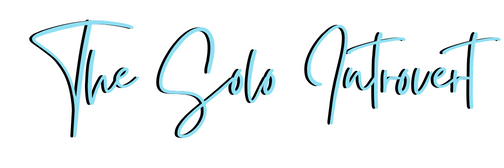By now you may be familiar with what makes an introvert, and how they differ from extroverts. Introverts tend to prefer quiet and solitude, and need that to recharge, while extroverts prefer people and external stimulation to gather energy and get amped up.
Does that mean it is bad to be an introvert? There are a lot of misconceptions about introverts, and in this post we’ll dive a bit more into the benefits and challenges of introversion, why the label introvert or extrovert doesn’t make one better than the other, and some practical tips of how to thrive as an introvert.

The Benefits of Being an Introvert
Let’s start with the good stuff!
Being an introvert means you’re up in your mind a lot – and not just overthinking! With introversion comes a lot of deep thinking and creativity. This thinking spins into rich inner worlds, deep self reflection and a thorough understanding of the world around you. This makes you a great problem solver, coming up with new ideas in creative ways.
This think first approach also shows in your relationships. Introverts are great listeners, making you a valuable friend, partner, and colleague. Understanding other peoples’ perspectives makes you empathic and your advise is wise and welcome.
While some may think you’re a loner, that’s not quite the case. Introverts enjoy solitude and are comfortable being alone, but that doesn’t make them anti-social. As such, you are most likely very self-sufficient and a great independent worker.
This solitude approach may also mean that you prefer to avoid conflict, or atleast stay away from petty drama. The neutral approach brings a side of peace and harmony to an otherwise rocky and unbalanced situation.

The Challenges of Being an Introvert
Not everyone can be superman/woman, and the same goes for introverts. The most obvious challenge of being an introvert is that we are “bad” in social situations. We’re not anti-social, or socially awkward, but we may struggle in larger groups, or in environments with a lot of noise and stimulation. There is so much to take in that we get overloaded pretty quickly.
Where extroverts thrive on the stimulation and recharge their battery, for introverts large gatherings and parties are actually a battery drainer, and require some recovery time.
This brings us to the next challenge introverts come across: we are often misunderstood by our more social extrovert friends. We can be seen as shy, aloof, or straight up unfriendly, because we don’t respond to situation in a similar outgoing way as energetic extroverts can.
These things can carry over in our relationships and careers. As introverts prefer smaller, closer connections, it may be more difficult to make meaningful connections. Things like networking for your career, which is based on many small-talk based events with large groups, can be difficult for an introvert to navigate. The lack of interest or excitement may carry over in the social situation, a recipe for a self fulfilling prophecy.
The makes introverts more at risk of being lonely and isolated. As much as introverts like and need their solitude to recharge, we are by no means all anti-social, and do want to have meaningful relationships and friendships. It may be more difficult to make and maintain these relationships, meaning that those without strong social support networks can experience loneliness.

How to thrive as an introvert
As an introvert, it’s important to recognize and embrace your strengths while also finding ways to manage the challenges that come with introversion. Accepting that you are introverted without any judgement attached is the most important part, which is sometimes easier said that done. Here are some practical tips for thriving as an introvert:
Setting boundaries and practicing self-care
Setting boundaries is crucial for us introverts because we need the alone time to recharge our energy. This could mean setting limits on how much social interaction you can handle, saying no to invitations or events that you know will be overwhelming, or carving out time in your schedule for quiet, solo activities. It’s also important to prioritize self-care by getting enough sleep, eating well, and engaging in activities that bring you joy and relaxation.
Finding meaningful social connections
Though we may not need as many social connections as extroverts, it’s still important to have a few close relationships that are meaningful and fulfilling. Look for people who share your interests and values, and seek out smaller, more intimate social settings where you feel comfortable. This could mean joining a book club, attending a small gathering with like-minded individuals, or finding an online community that shares your passions.
Leveraging introverted strengths in personal and professional settings
As we saw in our benefits, there are many strengths introverts have that can help us succeed in personal and professional settings. In the workplace, introverts may excel at tasks that require concentration, creativity, and attention to detail, such as writing, research, or problem-solving. In social situations, you may find success by taking on roles that allow you to showcase your strengths, such as volunteering for leadership positions or starting your own businesses!
Recognizing and challenging negative self-talk
Though not exclusive to any personality type, introverts often struggle with negative self-talk, telling yourself you’re not good enough, or that you’ll never fit in. It’s important to recognize these thoughts and challenge them by focusing on positive self-talk and self-affirmation. You can try writing down positive affirmations or reminding yourself of past successes when you’re feeling down. It’s also helpful to practice self-compassion by treating yourself with kindness and understanding.
Overall, being an introvert can have its challenges, but with the right mindset and strategies, introverts can thrive both personally and professionally. By setting boundaries, finding meaningful social connections, leveraging their strengths, and challenging negative self-talk, introverts can learn to appreciate their unique qualities and live fulfilling lives.
So, is it good or bad to be an introvert?
There are benefits and challenges to being an introvert. While we are great thinkers, listeners, and independent workers, we struggle with some social situations and can be misunderstood by our extroverted peers.
It’s important to recognise that being an introvert isn’t so much about being a good or a bad thing, it’s about understanding yourself so you can embrace and leverage your strengths, and practise self-care to help soften the challenges of being an introvert.
Our extroverted peers love us just the same, even if we don’t go to every party, just like we love them the same, even if they always want to do all the things at once!
What do you find your best introvert superpower? And what do you find most challenging about being an introvert?

